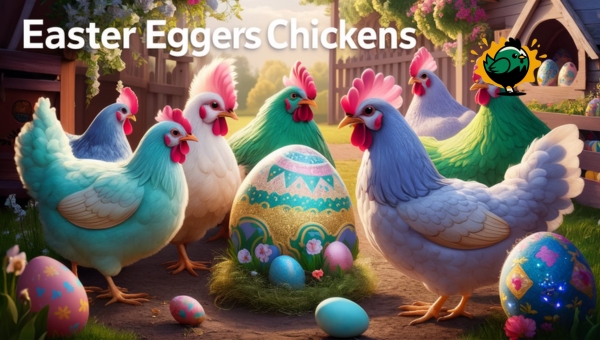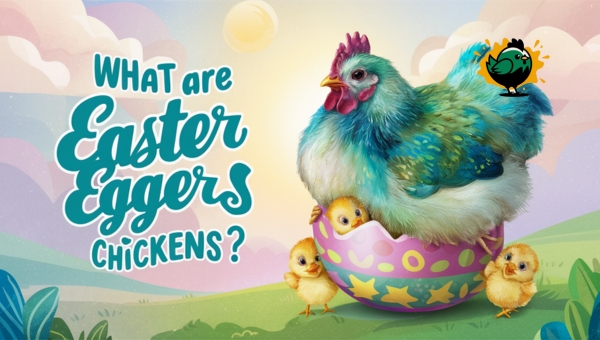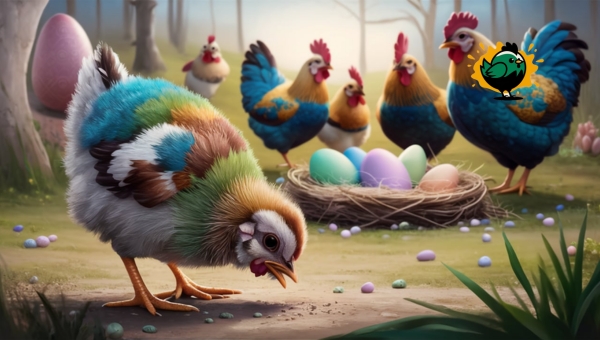Easter Eggers Chickens | The Colorful Egg Marvel

A sunny morning in your backyard, where a delightful surprise awaits in the chicken coop. You open the nesting box to find an array of pastel-colored eggs, each one a testament to nature’s artistry. Easter Eggers chickens are the charming architects behind this vibrant display. These unique birds bring a splash of color to your egg basket, offering more than just typical whites and browns.
With their diverse appearances and friendly temperaments, they make excellent companions for both novice and seasoned chicken keepers. Dive into the captivating world of Easter Eggers chickens and discover why they are a must-have for any backyard flock.
What Are Easter Eggers Chickens?
Easter Eggers chickens are a delightful addition to any flock, known for their unique and colorful eggs. These chickens are not a specific breed but rather a type of chicken that possesses an interesting mix of genetics.

Their charm lies in the variety they bring to the coop, making every egg collection an exciting surprise. As we delve into understanding the origin and characteristics of these fascinating birds, you’ll discover why they are highly favored by backyard chicken keepers. Let’s explore the unique attributes that set Easter Eggers apart from other chickens.
Understanding the Breed
Easter Eggers chickens have a fascinating background rooted in crossbreeding. They are not recognized as a standard breed by poultry associations but are instead a hybrid mix, primarily stemming from the Araucana and Ameraucana breeds.
This mix is what gives Easter Eggers their distinct ability to lay eggs in a variety of colors.
- Origins: Easter eggs originate from the mixing of Araucana chickens, known for their blue eggs, with other breeds. This combination results in chickens that can produce eggs in shades ranging from blue and green to pinkish hues.
- Basic Characteristics:
- Egg Production: They are prolific layers, typically producing about 200-280 eggs annually.
- Egg Colors: They are renowned for their colorful eggs, which can be blue, green, or even pink.
- Physical Traits: Easter Eggers often have a wide range of appearances, including various feather colors and patterns.
- Not a Pure Breed: Unlike standard breeds, Easter eggs are not a pure breed, leading to their diverse traits and appearances.
Their unique lineage and characteristics make them a popular choice for those looking to add a splash of color to their eggbasket. These chickens are not only valued for their aesthetic contributions but also for their friendly and adaptable nature.
Characteristics of Easter Eggers
Easter Eggers chickens are known for their captivating features and vibrant personalities. These chickens bring a splash of color and charm to any backyard setting.

Let’s dive into their most intriguing characteristics, from their unique egg colors to their diverse appearances and friendly nature.
Unique Egg Colors
Easter Eggers chickens are distinct because of the colorful eggs they lay. Their eggs can range in hue, making every collection a delightful surprise. Here are some colors you might find:
- Blue
- Green
- Pink
- Olive
This variety in egg color adds a special touch to your egg basket, making Easter Eggers a favorite among backyard chicken enthusiasts.
Diverse Appearance
Easter Eggers chickens exhibit a wide range of physical appearances. This diversity means each chicken can have its own unique look:
- Feather Colors: They can have feathers in shades of brown, black, white, or even a mix.
- Comb Types: They might have single combs or pea combs.
- Size Variations: Their size can vary, but they are generally medium-sized birds.
This variety makes them visually appealing and interesting to raise.
Friendly Temperament
Easter Eggers are known for their gentle and friendly nature. Their temperament makes them excellent companions for families and children.
Key points about their temperament include:
- Affectionate: They enjoy being around people and are often quite tame.
- Curious: They have a lively curiosity, making them fun to watch.
- Adaptable: They can adjust well to different environments and conditions.
These traits make Easter Eggers chickens a great addition to any backyard flock, providing both companionship and entertainment.
Care and Maintenance
Caring for Easter Eggers chickens involves several key steps to ensure they thrive. Firstly, provide a clean and secure coop to protect them from predators and harsh weather. The coop should be spacious, allowing each chicken to have enough room to move comfortably.
Secondly, a balanced diet is essential. Supply them with high-quality feed, supplemented with fresh vegetables and grains to maintain their health. Access to clean water at all times is crucial. Moreover, regular health check-ups help in identifying any potential issues early.
Observing their behavior can give insights into their well-being. Lastly, allow them some free-range time. This not only enriches their environment but also lets them exercise naturally. Consistent care will lead to happy and productive chickens.
Benefits of Raising Easter Eggers
Raising Easter Eggers chickens offers several appealing benefits for poultry enthusiasts and backyard farmers.

Here are some key advantages:
- Unique Egg Colors: Easter Eggers are renowned for their beautiful eggs, which can come in various colors such as blue, green, and sometimes pink. This variety adds a fun and visually appealing aspect to egg collection.
- Friendly Nature: These chickens are known for their gentle and friendly temperament. They often get along well with other chickens and can make great pets for families, especially those with children.
- Low Maintenance: Easter Eggers are hardy and adaptable, requiring minimal special care. They can thrive in different climates, making them suitable for various environments.
- Moderate Egg Production: While they may not be the top producers, they still lay a decent number of eggs, providing a steady supply for small households.
Also Read: Boo Boo Chicken – How to Care for Injured Chickens?
Challenges of Having Easter Eggers
Raising Easter Eggers chickens can be a rewarding experience, but like any other breed, they come with their own set of challenges.

It’s important to be aware of these potential issues to ensure a smooth experience. Let’s explore the common health concerns and egg production variability you might encounter with Easter Eggers.
Health Concerns
Easter Eggers chickens, while generally robust, can face several health challenges. Understanding these issues can help in maintaining their well-being:
- Respiratory Problems: These chickens may experience respiratory issues due to poor ventilation or changes in weather. Keeping their living area clean and well-ventilated can help prevent these problems.
- Parasites: Like many other poultry, Easter Eggers can be susceptible to mites and lice. Regular checks and treatments are essential to keep these pests at bay.
- Nutritional Deficiencies: Ensuring a balanced diet is crucial, as deficiencies can lead to issues like weak eggshells or poor growth.
- Avian Diseases: They can also be affected by common avian diseases such as Marek’s disease or coccidiosis, which require vaccination and prompt treatment.
Egg Production Variability
One aspect of Easter Eggers that can be both charming and challenging is their egg production:
- Inconsistent Laying Patterns: These chickens may not lay eggs as consistently as other breeds, which can be a concern for those relying on a steady supply.
- Seasonal Changes: Egg production can vary with the seasons, often decreasing in colder months. This is typical of many chicken breeds but is worth noting.
- Age Factor: As they age, their egg production tends to decrease, which is a natural part of their lifecycle.
Understanding these challenges can help you prepare and manage your Easter Eggers effectively, ensuring a healthy and productive flock.
Conclusion
Easter Eggers chickens are a captivating addition to any backyard flock, offering a delightful mix of unique egg colors and friendly personalities. They are low-maintenance and adaptable, making them suitable for both novice and experienced chicken keepers.
While they present some challenges, such as occasional health concerns and variable egg production, their benefits often outweigh the drawbacks. With proper care and attention, they can thrive and become a cherished part of your homestead.
If you’re interested in learning more about poultry or other fascinating animals, be sure to explore more insightful blogs on our site. Dive in and expand your knowledge today!
